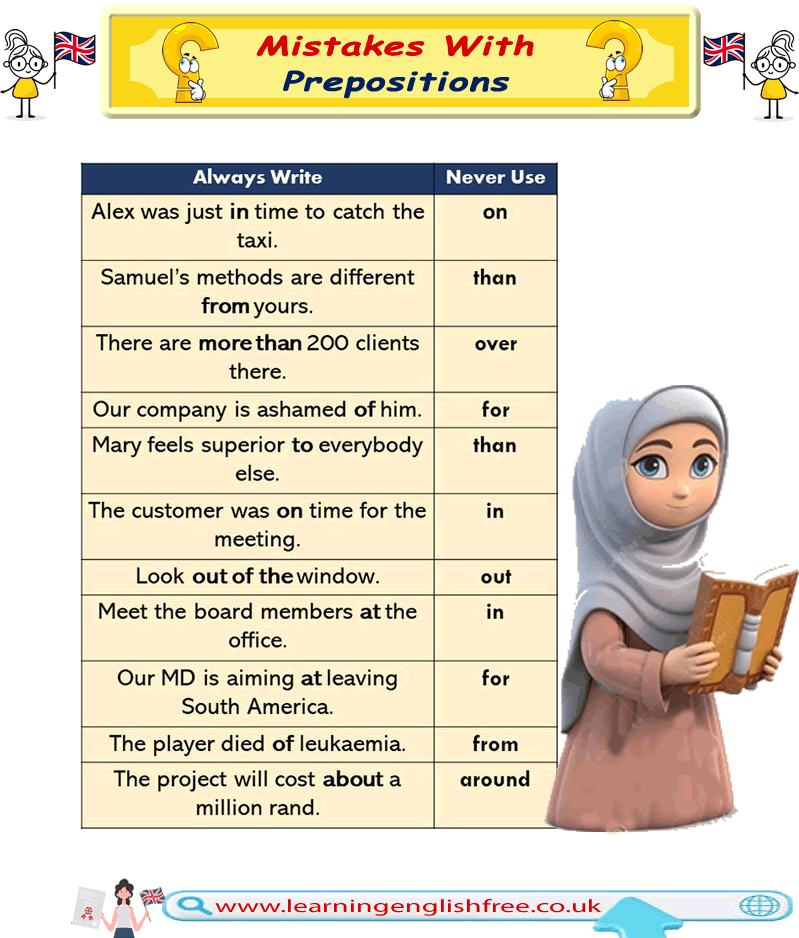
Navigating Prepositions: Understanding Common Mistakes
Prepositions are small words with big roles in the English language. They indicate relationships between other words in a sentence, often denoting location, direction, time, and more. However, for ESL (English as a Second Language) learners, prepositions can be tricky, leading to common mistakes that can easily confuse or change the meaning of a sentence.
This lesson focuses on identifying these common mistakes and providing strategies to avoid them, enhancing both your written and spoken English. By understanding the correct usage of prepositions, you'll be able to express yourself more clearly and accurately.
Useful Vocabulary for Mistakes with Prepositions:
- Preposition: A word used to link nouns, pronouns, or phrases to other words within a sentence.
- Phrase: A group of words that express a concept and is used as a unit within a sentence.
- Context: The circumstances or setting in which a word or phrase is used, affecting its meaning.
The importance of mastering prepositions cannot be overstated. They are essential for building coherent and comprehensible sentences. This lesson, written in beginner-friendly British English, aims to demystify prepositions and their correct usage.
Common Mistakes with Prepositions and How to Correct Them
-
Always write "on" before the day of the week.
- Meaning: Use "on" to indicate specific days.
- Example: "I will see you on Friday."
-
Never use "than" with different; always use "from."
- Meaning: "Different from" is the correct pairing, not "different than."
- Example: "Your ideas are different from mine."
-
Alex was just in time to catch the taxi.
- Meaning: Correctly uses "in time" to indicate a specific moment when an event occurs.
- Example: "She arrived just in time for the concert."
-
Samuel's methods are different from yours.
- Meaning: Correctly identifies the comparison between methods.
- Example: "His teaching methods are different from those used traditionally."
-
There are more than 200 clients there.
- Meaning: Correctly uses "than" for comparisons of quantity.
- Example: "We have more than 50 employees in our office."
-
Our company is ashamed of him.
- Meaning: Correctly uses "of" to express the relationship of shame.
- Example: "She was ashamed of her mistake."
-
Mary feels superior to everybody else.
- Meaning: Correctly uses "to" after superior to indicate comparison.
- Example: "He always acts superior to his colleagues."
-
The customer was on time for the meeting.
- Meaning: Correctly uses "on time" to indicate punctuality.
- Example: "She was on time for her appointment."
-
Look out of the window.
- Meaning: Correctly uses "out of" to indicate direction from inside to outside.
- Example: "He looked out of the door to see the rain."
-
Meet the board members at the office.
- Meaning: Correctly uses "at" to indicate a specific location.
- Example: "Let's meet at the café."
-
Our MD is aiming at leaving South America.
- Meaning: "Aiming at" is correctly used to indicate intention.
- Example: "She is aiming at improving her English skills."
-
The player died of leukaemia.
- Meaning: Correctly uses "of" to indicate cause.
- Example: "He died of natural causes."
-
The project will cost about a million rand.
- Meaning: Correctly uses "about" to indicate an approximate amount.
- Example: "The repairs will cost about £500."
Summary and Takeaways
Prepositions are pivotal in crafting sentences that are not only grammatically correct but also clear and precise in their meaning. This lesson has illuminated some of the most common prepositional pitfalls encountered by ESL learners and provided clear examples and corrections to guide your understanding and usage.
Practicing these examples in your daily writing and speaking will cement your knowledge and improve your fluency. Remember, the key to mastering prepositions is context—paying attention to how they're used in relation to other words.
To further your practice, consider writing sentences of your own, focusing on the prepositions highlighted in this lesson. Engage with English media, noting prepositions and their usage in different contexts.
Share your learning journey with us on our platform and visit our Facebook page at www.facebook.com/learningenglishfree.co.uk for more grammar tips and language lessons. Your feedback and questions are always welcome, and we're here to support your journey to English proficiency.
With diligence and practice, navigating the complex world of prepositions will become second nature, enriching your English communication skills and opening up new avenues for expression.
